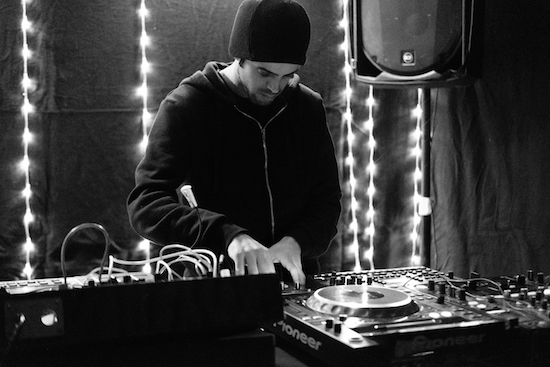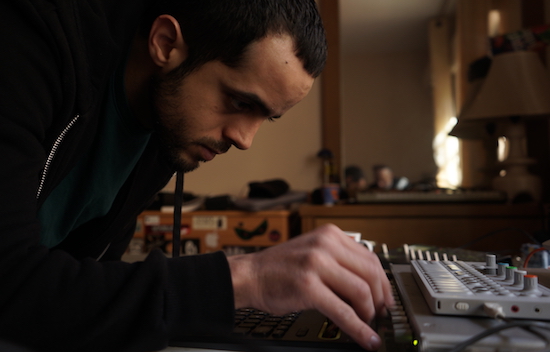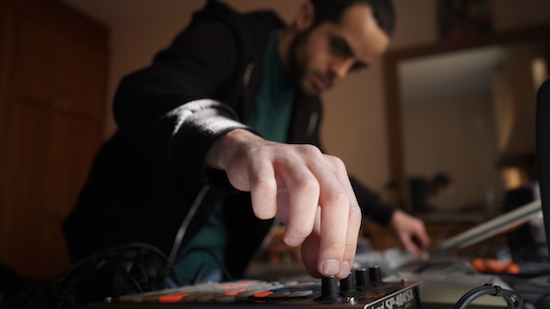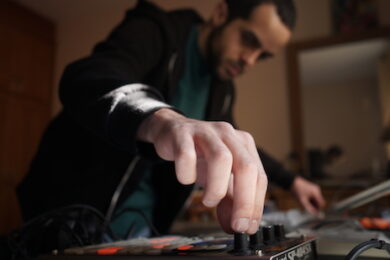Muqata’a by Raouf Haj Yihya
When promoting a new album, many musicians would be reluctant to admit that errors and inconsistencies formed a large part of that album’s identity. This is not the case with Palestinian hip hip and noise producer Muqata’a. “There are a few things that unite these tracks and I’ve figured out that it’s the errors in them”, he says of his new record, Kamil Manqus, which is Arabic for ‘whole imperfect’. “The beats are not exactly on the grid, things are changing the whole time. When you feel like you’ve got into a certain groove, then it’s gone all of a sudden. It’s this inconsistency, and the constant breaking of any kind of system – that’s the connection I found.”
Breaking down systems through sound has come to define the approach of the producer, who since the early 2000s has been one of the most important voices to come out of the Palestinian electronic music scene. One of the founding members of hip hop collective Ramallah Underground, Muqata’a now works as a solo artist. Over almost two decades, he has been developing a sound characterised by stuttering beats, grainy samples of traditional Arabic music, and field recordings documenting daily life in the streets around him.
Glitches and inconsistencies are not merely artistic preferences. His music has always existed in relation to the social and political conditions around him, functioning as a mirror to the jarring realities of life in the West Bank, where the ongoing Israeli military occupation means that Palestinians face constant disruptions, uncertainties and restrictions. As he puts it: “My whole life I’ve been living under occupation. Even though everything feels like it’s very stagnant and you feel like you’re stuck, there’s a lot of inconsistency, everything feels like it’s collapsing.”
When I catch up with him over Zoom, he’s in his new base of Berlin, (another city with a long history of stark geographic and political divisions), and is in a philosophical mood despite the weirdness of trying to adapt to a new home in the middle of lockdown. “The majority of Palestinians are refugees, or immigrants. We live all around the world, so being outside [the country] is part of the Palestinian story”, he says of his current situation. He grew up in Ramallah, but like most Palestinians, experiences of displacement and exile have formed part of his family’s narrative. “My family is from Safed, which is on the border of Lebanon”, he explains. “My grandparents were kicked out of there in 1948."
From an early age, music was part of his life: his mother loved to sing, he learnt the piano as a child, and he would regularly dive into his parents collection of tapes, which featured music from across the Arab world. Among these he encountered artists including Lebanese superstar Fairuz, and records by Egyptian singer Sheikh Imam, which he describes as “very anarchist music from the sixties. It’s very raw: solo oud and this guy singing very hardcore political songs.”
Inspired by those sounds, as well as the hip hop and jungle he was listening to, by his mid-teens, he’d already begun experimenting with making his own music. By the turn of the millennium, these explorations took on a far deeper sense of urgency and purpose. During 2002, Ramallah underwent several weeks of curfew imposed by the Israeli army during the Second Intifada, a major uprising against the occupation. “All of the cities of the West Bank were taken over with tanks, armed military vehicles, there were helicopters in the sky the whole time. There were soldiers everywhere. It was a complete lockdown." At that point, making music became a way to process the trauma of living in the middle of a conflict zone: “First of all, there was nothing else to do, and second of all, I didn’t want to be thinking about all those things around me, all that stress and frustration.”
As one of the core members of Ramallah Underground – then MCing under the name Boikutt, alongside his brother Aswatt and his friend Asifeh aka Stormtrap – he found himself immersed in the sampling techniques derived from hip hop, channelling the genre’s protest ethic to draw attention to the injustices of the occupation. Hip hop resonated strongly with him and his friends, who were seeking ways to express themselves and draw attention to their experience, or as as he puts it, “expressing yourself in a very direct manner”.

Muqata’a by Nick Newsom
Since Ramallah Underground disbanded in 2009, Muqata’a has been steadily developing a body of work focused primarily on instrumental compositions. Kamil Manqus, his fifth solo record, is dense and introspective, full of his signature gritty, distorted beats, which often shift tempo or disintegrate part way through a track, while snippets of vocals and crackly samples drift ominously in the background. While the album began to take on more of a political resonance late in the process, it began life ordinarily enough. “In the beginning, I didn’t have the exact concept of the album. I was just putting sounds together, collecting radio recordings. I was also making loops on my laptop, using the Octatrack and the OP1, the SP404, sampling things from vinyl, the usual”, he says. Yet he acknowledges that the jagged, glitchy aesthetic that tied the tracks together mirrors the disruptions of everyday that are a daily reality in the West Bank.
This ‘inconsistency’ manifests itself in all sorts of ways, making simple things like getting hold of music equipment complicated. “Everything’s triple the price”, he remarks, “but you can get whatever you need if you have the money. That’s why everyone tries to get things from someone coming into Palestine. They will order it from a friend.” However, the main way in which the occupation distorts and ruptures daily life is through restrictions on freedom of movement. For artists and musicians, this poses a major obstacle to being able to tour and share their work.
“That’s something we always talk about: how difficult it was for me, or for any Palestinian artist, to come and perform [in Europe]. For many, it just doesn’t work out in the end. They don’t get the right documents or they’re not allowed to leave Palestine.” Travelling to Europe means first crossing into Jordan, which presents its own set of difficulties. “It’s always super difficult to leave Palestine, because we have to go to Jordan first, because we’re not allowed to have an airport. The borders are controlled by the Israeli authorities. Sometimes you don’t get let in. Sometimes you have to wait nine hours."

Muqata’a by Raouf Haj Yihya
But as well as documenting the brutal, monotonous realities of living under a permanent state of siege, the album is also concerned with the past. In particular, Muqata’a began seeking ways to connect with a sense of ancestral memory through his music. This he explored through a practice called Simya, an esoteric belief system related to Sufism, the mystic branch of Islam. “Simya is an ancient spiritual science, very similar to alchemy. But the elements here are the numbers and the letters. They’re written down in specific patterns, and if you have the right pattern, you can reach the immaterial world.”
Instead of applying numeric values to words in the Quran, as practitioners of Simya used to do, Muqata’a applied the concept to music. “It’s a concept that I still don’t understand completely, but it’s something that I was interested in using metaphorically, using the music to represent the numbers, and using vocal bits to represent the alphabet. I was creating my own patterns to communicate with my ancestors." Rather than being a solely spiritual or mystical practice, this is an approach that has concrete political consequences. As Israel continues to annexe land and build more settlements across the West Bank, trying to hold on to a sense of Palestinian cultural identity becomes a political act: “Since Palestinians live on collective memory, a lot of our archives and our documented history have been either destroyed, erased or stolen. We’re being erased as a people. For me to tap into that kind of memory, it’s a way to preserve our history.”
Despite the restrictions of the current lockdown, moving to Europe has so far been a positive step for Muqata’a, and his music has been well received. “It’s been great. Every time I perform, I’m always meeting people after the show. We’re always discussing things, talking about how we can shape the future that we’re going to be living in.” He also feels that music is a way of opening up discussions that have so far largely failed in the political sphere. “It’s putting Palestine on the map, which is definitely bringing new people into the discussion, people that wouldn’t otherwise be interested in the political situation. They’re into electronic music or hip hop, and then they hear something from Palestine. We connect and then we’re talking. Then we’re just telling our story.”



